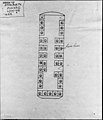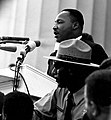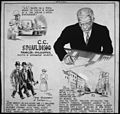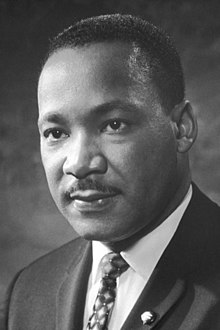Portal:Civil rights movement
The civil rights movement portal The civil rights movement was a social movement and campaign from 1954 to 1968 in the United States to abolish legalized racial segregation, discrimination, and disenfranchisement in the country. The movement had its origins in the Reconstruction era during the late 19th century and had its modern roots in the 1940s, although the movement made its largest legislative gains in the 1960s after years of direct actions and grassroots protests. The social movement's major nonviolent resistance and civil disobedience campaigns eventually secured new protections in federal law for the civil rights of all Americans. After the American Civil War and the subsequent abolition of slavery in the 1860s, the Reconstruction Amendments to the United States Constitution granted emancipation and constitutional rights of citizenship to all African Americans, most of whom had recently been enslaved. For a short period of time, African-American men voted and held political office, but as time went on Blacks were increasingly deprived of civil rights, often under the racist Jim Crow laws, and African Americans were subjected to discrimination and sustained violence by white supremacists in the South. Over the following century, various efforts were made by African Americans to secure their legal and civil rights, such as the civil rights movement (1865–1896) and the civil rights movement (1896–1954). The movement was characterized by nonviolent mass protests and civil disobedience following highly publicized events such as the lynching of Emmett Till. These included boycotts such as the Montgomery bus boycott, "sit-ins" in Greensboro and Nashville, a series of protests during the Birmingham campaign, and a march from Selma to Montgomery. At the culmination of a legal strategy pursued by African Americans, in 1954 the Supreme Court struck down the underpinnings of laws that had allowed racial segregation and discrimination to be legal in the United States as unconstitutional. The Warren Court made a series of landmark rulings against racist discrimination, including the separate but equal doctrine, such as Brown v. Board of Education (1954), Heart of Atlanta Motel, Inc. v. United States (1964), and Loving v. Virginia (1967) which banned segregation in public schools and public accommodations, and struck down all state laws banning interracial marriage. The rulings played a crucial role in bringing an end to the segregationist Jim Crow laws prevalent in the Southern states. In the 1960s, moderates in the movement worked with the United States Congress to achieve the passage of several significant pieces of federal legislation that authorized oversight and enforcement of civil rights laws. The Civil Rights Act of 1964 explicitly banned all discrimination based on race, including racial segregation in schools, businesses, and in public accommodations. The Voting Rights Act of 1965 restored and protected voting rights by authorizing federal oversight of registration and elections in areas with historic under-representation of minority voters. The Fair Housing Act of 1968 banned discrimination in the sale or rental of housing. (Full article...) Selected article -A United States federal statute honoring the Birthday of Martin Luther King Jr. and his work in the civil rights movement with a federal holiday was enacted by the 98th United States Congress and signed into law by President Ronald Reagan on November 2, 1983, creating Martin Luther King Jr. Day. The final vote in the House of Representatives on August 2, 1983, was 338–90 (242–4 in the House Democratic Caucus and 89–77 in the House Republican Conference) with 5 members voting present or abstaining, while the final vote in the Senate on October 19, 1983, was 78–22 (41–4 in the Senate Democratic Caucus and 37–18 in the Senate Republican Conference), both veto-proof margins. Prior to 1983 there had been multiple attempts following the assassination of Martin Luther King Jr. to have a holiday created in his honor with Representative John Conyers introducing legislation in every legislative session from 1968 to 1983. In 1979 a vote was held on legislation that would have created a holiday on the third Monday in January, but it failed to receive two-thirds support and was later rescinded following an amendment changing its date. While attempts were made to have a federally recognized holiday, numerous U.S. states recognized holidays in honor of King. Connecticut did so in 1973. Illinois adopted a commemoration day in 1969, and made it a paid holiday also in 1973. Other states continued to adopt state holidays up through Utah in 2000. (Full article...)General imagesThe following are images from various civil rights movement-related articles on Wikipedia.
Related portalsWikiProjectsSelected biography -Martin Luther King Jr. (born Michael King Jr.; January 15, 1929 – April 4, 1968) was an American Christian minister, activist, and political philosopher who was one of the most prominent leaders in the civil rights movement from 1955 until his assassination in 1968. A black church leader and a son of early civil rights activist and minister Martin Luther King Sr., King advanced civil rights for people of color in the United States through the use of nonviolent resistance and nonviolent civil disobedience against Jim Crow laws and other forms of legalized discrimination. King participated in and led marches for the right to vote, desegregation, labor rights, and other civil rights. He oversaw the 1955 Montgomery bus boycott and later became the first president of the Southern Christian Leadership Conference (SCLC). As president of the SCLC, he led the unsuccessful Albany Movement in Albany, Georgia, and helped organize some of the nonviolent 1963 protests in Birmingham, Alabama. King was one of the leaders of the 1963 March on Washington, where he delivered his "I Have a Dream" speech on the steps of the Lincoln Memorial, and helped organize two of the three Selma to Montgomery marches during the 1965 Selma voting rights movement. The civil rights movement achieved pivotal legislative gains in the Civil Rights Act of 1964, Voting Rights Act of 1965, and the Fair Housing Act of 1968. (Full article...)Selected image - Civil rights activists stage a sit-in at Woolworth's in Durham, NC to protest against racial segregation. (10 February 1960)
Did you know?
TopicsSubcategoriesThings to doAssociated WikimediaThe following Wikimedia Foundation sister projects provide more on this subject:
Discover Wikipedia using portals
|






















































